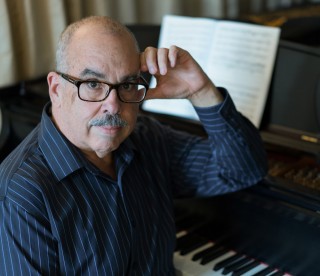Title

Puerto Rican composer Roberto Sierra's Concierto Virtual will be performed by the New Juilliard Ensemble—and a playerless piano—on the opening night of the Focus! festival.
(Photo by Virginia Sierra)Back in 1993, I assembled a program of Latin American music for my first series of Summergarden concerts, at the Museum of Modern Art. More than two decades later, a Latin American Focus! seemed badly needed, even if the six festival concerts could only scratch the surface of the region's huge compositional resources. I wanted to emphasize composers still living in their home countries but could not exclude the Latin American diaspora—composers who went abroad for education, opportunity, and in many cases, to escape the horrendous persecution and violence of military regimes. I've consulted extensively with composers in Latin America and elsewhere, assembling lists especially of young composers and seeking honest assessments of their talent, and despite the flood of scores and recordings, it's impossible to know what great talents were missed.
Body
Because the quantity of Latin American composers is truly staggering, I had to create limitations, favoring those who remain in their home countries while including some émigrés and a few pioneers. Above all, I wanted to illustrate the stylistic diversity that makes the term Latin American composer difficult to define other than geographically. Since the festival's primary aim is to allow Juilliard students to extend their experience and skills, I've excluded purely electronic music and music requiring indigenous instruments as well as music-theater and popular music. Limiting the festival almost entirely to living composers didn't make me happy, but a few reminders of the pioneers are found in the opening and closing concerts.
The festival's opening concert, on January 20 by the New Juilliard Ensemble, features a world premiere by Alejandro Iglesias Rossi, one of the senior Argentine composers and the founder of the Orchestra of Indigenous Instruments, in Buenos Aires. His music's strong relationship to indigenous cultures creates a peculiarly eerie dramatic effect that I find very powerful. There's a U.S. premiere by Mexican composer Alejandro Castaños, Detours, which impressed me with its strong personal stamp and great variety of character. Also on the bill is First Cuban Suite by modernist pioneer Alejandro García Caturla (1906–40), who created a fascinating, quirky fusion of folkloric and ultra-modernist music, the latter of which he was exposed to when Nicolas Slonimsky conducted a concert in Havana with Henry Cowell playing his tone-cluster piano concerto. There will also be a piece by Brazilian composition pioneer Mozart Camargo Guarnieri (1907–93).
The most unusual work on the program is Puerto Rican composer Roberto Sierra's Concierto Virtual, for virtual piano and chamber orchestra, that is to say, a piano concerto without a pianist. It began when Sierra offered to rewrite his Concertino for Chamber Orchestra and Tape, composed for N.J.E. in 1995, which he felt was too dense. As he worked, however, he decided to write something entirely new—a piano concerto in which the soloist's part would be synthesized and performed from a CD or files. I wondered if the piece could be done “live” by a Yamaha Disklavier, and Makia Matsumura (MM '99, composition), the New York operations and technical specialist for Yamaha New York, was very generous with her expertise and determined that only the newest model, the Yamaha Disklavier ENSPIRE—which Yamaha has graciously provided without charge—would be capable of playing the superfast Sierra score. Incidentally, the ENSPIRE isn't an electronic instrument, but a real piano that can be played normally or by automation, and seeing it play the Concierto Virtual, the keys seemingly jumping up and down as if overdosed on caffeine, is an unforgettable experience. In the concert, a video camera trained on the keyboard will allow the Concierto Virtual to be fully and astonishingly shared.
To end the festival, the Juilliard Orchestra will play a program curated by its conductor, Carlos Miguel Prieto, and Ara Guzelimian, provost and dean. It will feature two pieces by the pioneer generation of Latin American composers—Alberto Ginastera's Harp Concerto and Silvestre Reveultas's Sensamayá—and two pieces from younger composers—Gabriela Ortiz, a professor of composition in Mexico City, and Reinaldo Moya (MM '08, DMA '13), a Venezuelan who teaches in Minnesota.




